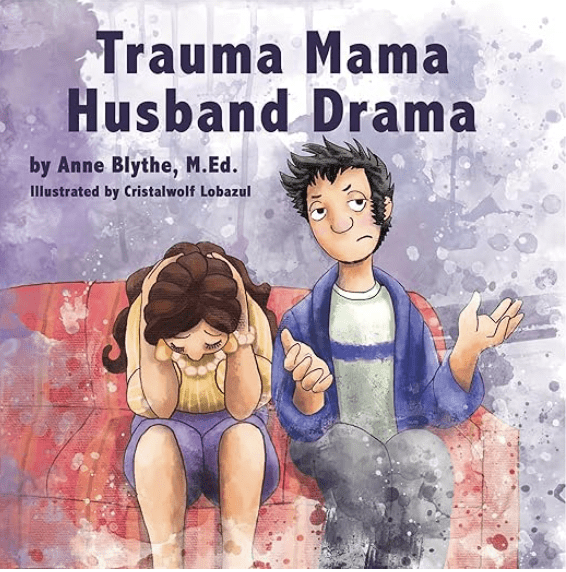Has someone told you that you’re trauma bonded with your emotionally abusive husband? Are you looking for trauma bonding examples? Here are a few, but they’re NOT what you’re expecting.
True Trauma Bonding Examples
A trauma bond is something that bonds two people together who have been through a traumatic event, like a tornado or shipwreck. You feel closer because you have been through a traumatic experience together. Here are a few trauma bonding examples:
- Siblings are bonded due to their shared traumatic experience growing up with an abusive mother.
- Friend are bonded due to their shared traumatic experience being robbed in an alley.
- A family is bonded due to their shared traumatic experience of their house burning down.
What Is The Manufactured Relational Tether?
The manufactured relational tether is the result of the abuser creating chaos and stress that only he can solve. By keeping his victim close, battering her emotionally and/or physically, and offering relief intermittently, he traps her emotionally.
It’s like a tether ball. He manufactures a situation where it’s like he hits the ball (you), and you’re flying through space. You feel very insecure. You feel worried, and then the ball wraps around the pole and for a brief moment, you feel relief. You feel safe. Then it starts to unravel, and begins feeling very uncomfortable. Then he hits it again, and it wraps around, and for a moment you feel safe. And you unravel again. To get out of his control, you have to detach yourself from the cord.
Anne Blythe, M.Ed., Producer & Host of The Betrayal Trauma Recovery Podcast
What Does The Manufactured Relational Tether Feel Like?
When your emotionally and psychologically abusive husband has manipulated you into believing that your wellbeing and security is dependent him through intermittent “kindness”, it may be difficult to identify that he’s manufacturing a situation to manipulate you to feel . . .
- Dependent on him
- Simultaneously disgusted by and drawn to him
- Frustrated with yourself for not leaving or maintaining firmer boundaries
- Confused by his words and behavior
- Unworthy, unimportant, and unloved
- Ashamed, guilty, and complicit in the abuse – especially if it’s sexual in nature
If you feel attached, loyal, or subject to or protective of your emotionally psychologically abusive husband, you’re not trauma bonded. You’re experiencing his manipulation via the Manufactured Relational Tether.
When A Therapist Says Your Trauma Bonded
If you’ve had a therapist suggest that your trauma bonded with your abuser, reject the idea. Since an abuser can’t bond with anyone, there is no bond between you.
One victim shared, “I was so confused because he hurt me, but then I’d turn to him for comfort. It felt like craving poison.” If you’ve felt like this, it’s not a trauma bond. It’s the compounded gaslighting and manipulation the abuser did to cause you to feel attached. He did it by grooming you, comforting you, and then emotionally hurting you. Then starting over again.

Hoping To Break Free (Without Victim Blaming Trauma Bonding Examples)
When you know exactly what is happening and why it’s easier to break free. If you think that somehow you’re destined to be together or that fate keeps pulling you back in, know that’s exactly how the abuser wants you to feel.
18 Examples of Manufactured Relational Tethers (So-Called Trauma Bonding Examples)
- An abuser might suddenly become distant, making you crave their affection. When they finally give it to you, it feels like a relief.
- Frequent emotional highs and lows keep you off balance, making you dependent on the abuser for stability.
- By isolating you from friends and family, the abuser becomes your sole source of emotional support.
- Making you doubt your reality keeps you reliant on the abuser for “clarity.”
- Over-the-top displays of affection followed by withdrawal create a cycle of craving and relief.
- Controlling finances makes you dependent on the abuser for basic needs.
- Constantly undermining your self-worth makes you seek validation from the abuser.
- The abuser creates problems only they can solve, making you feel grateful for their “help.”
- Pushing your boundaries until you have none, making you feel like you can’t live without them.
- Making themselves appear as the victim to elicit your sympathy and guilt.
- Involving third parties to make you feel jealous or insecure.
- Intermitten approval keeps you hooked, like a slot machine’s unpredictable rewards.
- Acting loving in public but abusive in private confuses your perception.
- Repeated promises to change that never materialize, keeping you hopeful.
- Making you feel responsible for their abusive behavior.
- Affection that’s given or taken away based on your behavior.
- Creating standards you can never meet, making you constantly strive for their approval.
- Manipulating or using your children to control you.
Why Knowing The Difference Between True Trauma Bonding Examples and Manipulation Matters
A Betrayal Trauma Recovery Group Session client shared her experience, which highlights the confusion and manipulation involved in these relationships. She felt like she couldn’t leave her abuser even though she knew it was the right thing to do. Her attachment was a result of manipulation, not a genuine bond.
“The easiest, safest place to go for help is obviously Betrayal Trauma Recovery Group Sessions. Other therapists told me it was my fault I was emotionally attached. They didn’t understand this type of emotional & psychological abuse. To blame a victim for her own abuse isn’t ethical.”
Moving Forward After Being Accused of Being Trauma Bonded With Your Abuser
So how do you break free from his psychological manipulation? Here are some ideas . . .
- Open up to a safe person or safe group, like Betrayal Trauma Recovery Group Sessions
- Become educated about betrayal trauma and what causes it
- Practice radical self-care daily
- Learn more about how to Live Free from the Manufactured Relational Tether in the BTR.ORG Living Free Workshop


0 Comments